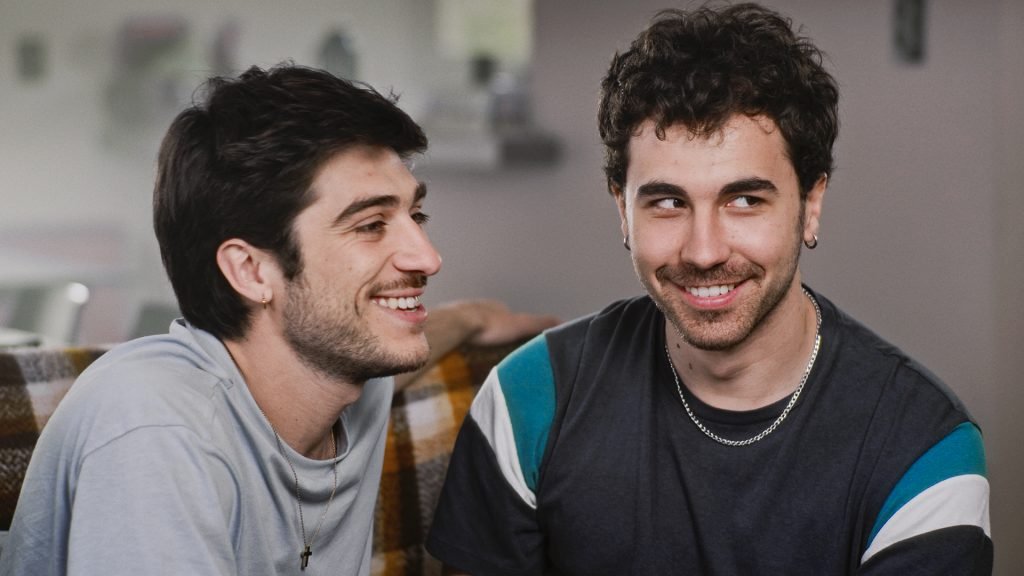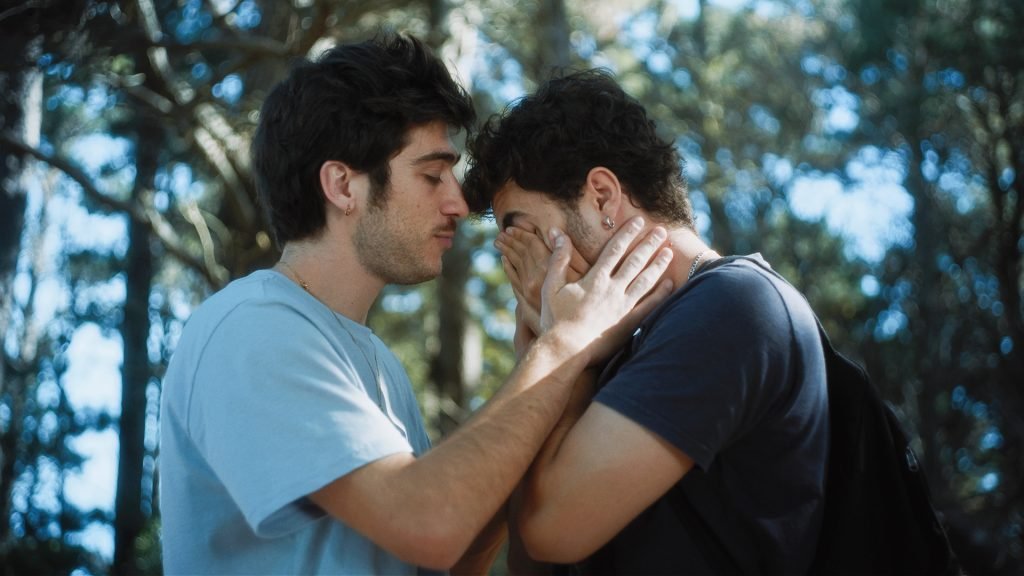Argentinian writer-director Marco Berger rose to prominence with his first feature, Plan B (2009), and went on to make Absent (2011, Ausente, which won the Teddy Award for Best Feature Film at the 2011 Berlinale), Hawaii (2013), Taekwondo (2016, co-directed with Martín Farina), Young Hunter (2020, El cazador), and others. Berger’s films have been acclaimed by critics and audiences alike for their bold and inventive displays of homoeroticism and male physicality, as most of his films play with themes of sexual connection and romance between men. His newest feature, The Astronaut Lovers, stars Javier Orán and Lautaro Bettoni as Pedro and Maxi, two friends in their early 20s—the former openly gay, the latter fresh out of a relationship with a woman—entangled in an exceptionally flirtatious summer friendship that turns into a fake dating scenario.
The Astronaut Lovers continues on to screen next at the 2025 BFI Flare: London LGBTQIA+ Film Festival after enjoying its world premiere at the Buenos Aires International Festival of Independent Cinema (BAFICI). While he wants to present to us his perspective on life, which often features relationships between men, he also wants to detach us from seeing his work solely through the label of queer cinema, he says in a new interview with Purple Hour.
*****
Purple Hour: You’ve spoken about how you’re dedicated to centring gay characters and queer stories. How do you see The Astronaut Lovers as a continuation of this work—how does the film add to your oeuvre as you see it?
I wanted to work with the genre of romantic comedy. I think I made Plan B as a comedy. Taekwondo is also a comedy, but it always had this kind of artsy style. I really love that but it was kind of [with the times] and slow, and the love grows in a different way than in The Astronaut Lovers. It was like a game for me. I said, you have to imagine you can make only one film that represents you and everything you want to show. Imagine you have only one film you can send into the universe. I said, I have to write this film and it has to be a comedy because I’m a romantic comedy fan. I remember Pretty Woman and all of the Meg Ryan films from when I was a teenager. But there aren’t that many romantic comedies in queer cinema—in a way, it’s not [very common]. You have love stories, but not romantic comedies like those of Emmanuel Mouret, like a very standard romantic comedy. That’s why I wanted to make this film.
When I made Plan B, it was too much for me because it was my first film, and suddenly it was everywhere, like in 100 festivals, and it was kind of a cult film at that time. I knew I didn’t want to repeat the recipe—because it’s very normal to take the recipe and make a similar film. That’s why my second film was Absent. But 10 years after Plan B, now I wanted to repeat the recipe. That’s why it’s very similar to Plan B, and that’s why in the film I have the red bucket from Plan B and I also have the sentence when he says “You think about a plan B…”. For me, it’s kind of like Plan B “reloaded”.
The film also contains two tropes that are very common in romantic comedies: fake dating and two people falling for each other but refusing to acknowledge it. Were you thinking about certain narrative structures or tropes that are part of the genre?
I wrote the script very cleanly with no [strict] ideas in the middle. Of course, I knew in one moment [what the story suggests], as the producer [pointed out] that [the two main characters] are onscreen almost the entire time. But I think I made it very freely—sometimes, I don’t care. It’s like I made the film for me. I wanted to make the perfect romantic comedy for me, and I hope people like it.

Many of your past films are quite visually explicit, while The Astronaut Lovers is perhaps instead more “verbally” explicit. How do you go about writing a dialogue-heavy script that is almost two hours of fast-paced jokes and dialogue?
It was a challenge. People said that maybe it’s too strong with The Astronaut Lovers because the characters speak about poo and make jokes about being gay and about dick size all the time. I also had this problem with Plan B. But I knew I wanted to create shock around [taboo topics] because it’s also a political position. It’s like saying we are going to normalise this. We’re going to talk about being gay; we’re going to talk about relationships, sex, everything. If one man from London goes to see Joker, nobody is going to tell him, “You are going to see a film about a psychopath because you are a psychopath.” With queer films, if a man goes to see one of my films, people are going to point to him and say, “You are going to see a gay film, so maybe you are gay.”
For jokes, I used to study the scripts from Friends to understand how the humour works. I wanted to use the sitcom structure for this film. That’s why they speak the whole time. Sometimes I have to Google similar words for things [for a joke], or there were certain things in my house [that I reference in the film], like what jokes I could make with Disney films like Dumbo or The Little Mermaid.
The visual style is very bright, where the scenes between Pedro and Maxi seem like they’re almost bathed in light, often in the foreground with a lot of depth to the background and production design.
Sometimes I work with colours. Especially with this film, I would say, I want this special colour, like purple or light blue or pink. But if you don’t have all the money you need, you have to do what you can. I had the same cinematographer [Mariano de Rosa] as in Young Hunter, and I let him be very free. He taught me to open up more and not to be so close [to the actors]. In the moment, I work really fast, because independent films do not have that many days to shoot.
I love the shot in the video rental store where you see all the shelves behind Pedro and Maxi extending into the background. It’s very beautiful.
As I direct, I make a portrait, then I look and say change this, change that—[it happens] very quickly. Take this plant, put in this colour, change this. It’s like a frame from a museum, in a way, like a painting. I really like to think of films like paintings. It’s not random. I take a lot of care with my images. I don’t use camera movement a lot. I have a very sharp idea of each moment [captured onscreen].



Is there anything else specific to your work you feel is important to highlight that we haven’t touched on yet?
There’s something strange for me, because I am considered the guy who makes queer films. I think I’m just a guy who makes films, not someone who makes them in a special way because I wanted to make a queer romantic comedy Nobody’s going to ask, for example, Stephen Spielberg or Tim Burton about this “new straight film” they made, or why they only makes straight films. I always say, of course it’s political. I want to show my world, but I also just want to make films. It’s not like I wanted to make something “special”. I want people to see through my eyes, because you can see through Scorsese’s eyes about violence, or through Tim Burton’s eyes about the dark side. I want to show people my point of view or how you feel when you’re gay and people don’t know, or your family doesn’t know, that you’re in the closet. I love that we’re seeing queer festivals, because they have to exist. But some days you feel like you’re [filed away] in a different folder. It’s like you have all the directors, and then you have the queer directors.
Certainly—you don’t want to be categorised as just a gay filmmaker or a queer filmmaker.
Nobody’s going to say, “Pretty Woman is such a beautiful, straight film.”
Maybe we should start analysing films that way and be a little rebellious about it.
I have to be really careful so people don’t say that I’m denying I’m gay—because I’m not denying that, and I don’t want to deny that. But it is very difficult because it’s case-by-case with each film. Sometimes it’s good, but sometimes I wonder why [things have to be this way]. Sometimes you hate it, sometimes you love it, because people really like your work. I’m happy to be gay and I’m happy to represent so much to people, but it’s difficult. The assumptions that are made [about your work] can be very difficult.
*****
The Astronaut Lovers will screen as part of the 2025 BFI Flare on Thursday, 27 March, and Friday, 28 March.
Watch the trailer for the film here:





